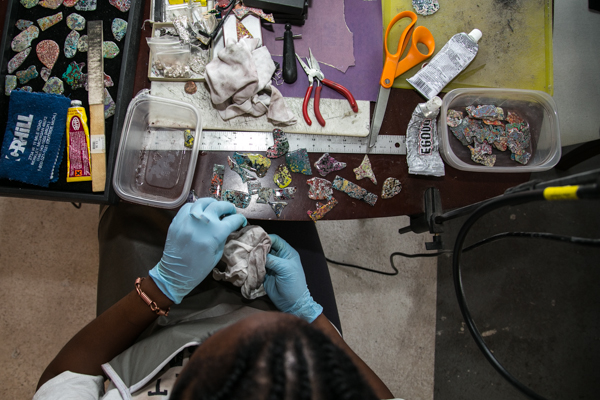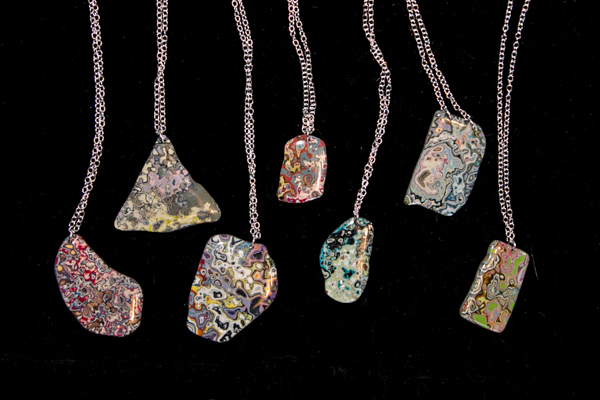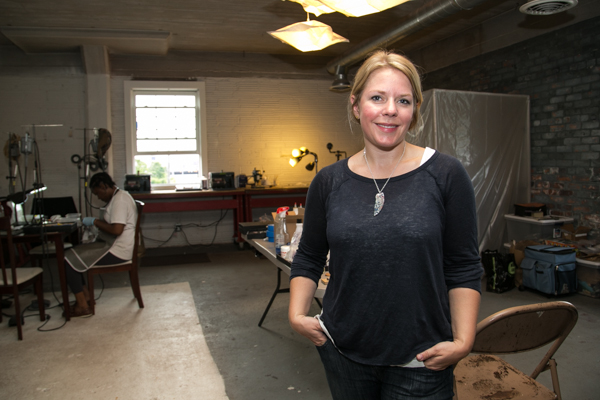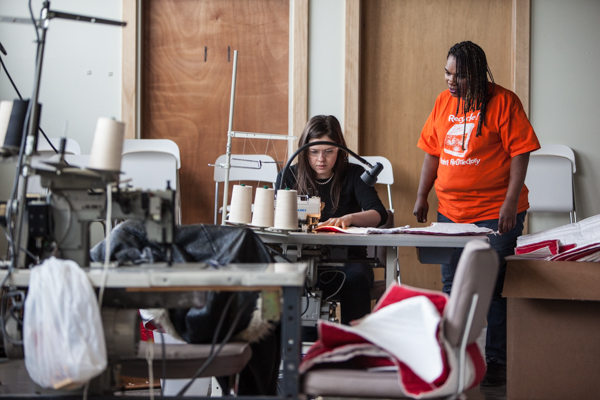The state of social entrepreneurship in Detroit
Social entrepreneurship is on the rise in Detroit. Aaron Mondry brings us this story about three local social ventures making names for themselves and how the city and the state are making a splash on the national social entrepreneurship scene.
In recent years, Detroit has been the setting of several prominent business success stories, from the growth of restaurants like Slows Bar-B-Q to the rise of high-end watch manufacturer Shinola. These profitable companies have contributed to and benefited from the Detroit revival narrative and we are all familiar with their stories.
But there is a growing number of Detroit business ventures concerned with more than simply making products and earning profits, and their success is equally as important to Detroit’s future as that of traditional businesses. They’re called “social enterprises,” and their story deserves the same amount attention we give to traditional business development in the city.
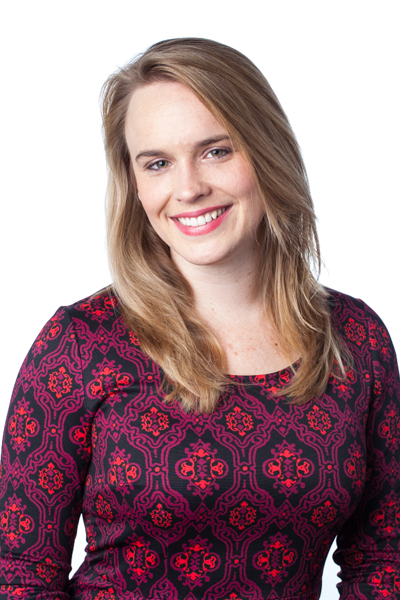
Elizabeth Garlow, executive director of Michigan Corps, a nonprofit that fosters entrepreneurship throughout the state, defines social enterprises as “companies that create financially sustainable, systems-changing solutions to social problems.”
In other words, the primary concern for these entrepreneurs is not profit, but social impact. Frequently they see a problem first, then harness the efficiencies and innovative possibilities of capitalism to try and solve it.
By making profit of secondary importance, these entrepreneurs must accept returns that are lower than they would be were it not for their social mission. This is something to keep in mind when examining these companies’ bottom lines.
“You can’t look at traditional models of productivity because of the added cost,” says Garlow.
The Empowerment Plan, a Detroit company based in Corktown’s Ponyride, manufactures coats that double as sleeping bags, some of which are donated to homeless people. The company hires female employees living in shelters, then provides them with training and a no-strings $1,500 microloan. CEO Veronika Scott proudly proclaims a perfect track record of moving these women out of shelters within three months.
But that additional cost is significant. It can make investors impatient and sustainability a struggle.
Two years ago, Fresh Corner Cafe, a Detroit company based in the Green Garage that makes healthy, affordable wraps and salads and sells them in places where access to fresh food is limited, was experiencing financial difficulties when sales from corner stores and gas stations alone could not sustain the business.
“That felt like a defeat,” says Fresh Corner co-owner Noam Kimmelman. “[But after examining the numbers,] I realized it was costing us just 25 cents per unit of salad that we added to each store. Show me one nonprofit vendor in the world that’s delivering salads for 25 cents per person. When you look at it that way, it’s a success.”
Amy Peterson, co-founder of Rebel Nell, a Detroit company that employs women hired from shelters to make graffiti-inspired jewelry, echoes Kimmelman’s sentiment.
“The profits for a social enterprise won’t seem as significant if you measure the financial returns only, but the returns from a social aspect are huge,” she says.
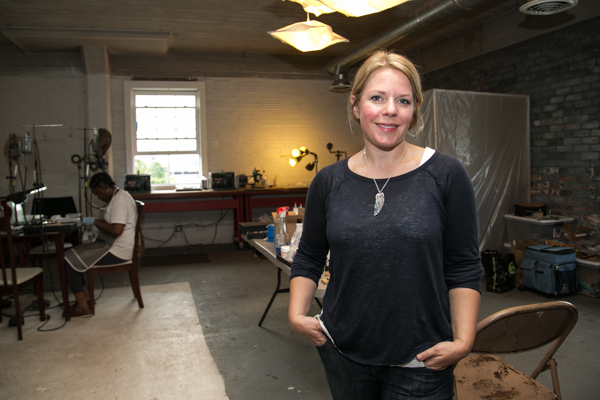
Garlow describes social entrepreneurs as having to maintain a “bifurcated identity.” Whereas strictly for-profit companies have to answer exclusively to investors and customers, social enterprises also have to consider their communities and social beneficiaries.
“If the goal was to make money, I would have chosen a different route,” says Kimmelman. “Owning a business is not the easiest life. It’s rewarding, but it would be less rewarding if the only rewards were profit.”
Peterson mentions another “cost” of social entrepreneurship not commonly discussed: the emotional connection.
“It’s one thing to let myself down, but now I have these women that have become family and I’ll be damned if I let them down. They’ve been let down so many times already…It adds a layer of pressure.”
A personal story is often the origin of a social entrepreneur’s passion. For Veronika Scott, she realized that she was providing the opportunity she wished her own mother had received.
The daughter of two unemployed parents, Scott grew up poor.
“[This business] ties directly into my life,” she says. “Growing up when your parents are at rock bottom — during the worst point in other people’s lives — is a difficult place to be. Poverty has an effect outside lack of money and food. It has an effect on the mind. I grew up being treated as an extension of my parents, as if I was already worthless and a drain on society right out of the gate.”
One of the Empowerment Plan’s main goals is to liberate the women who work there from low self-esteem.
When Scott hires someone from the shelter, she tells them with confidence, “This is your opportunity for a clean slate. I will not judge you for what you have been through. I will not hold that against you in this employment. What you do here is all that matters.”
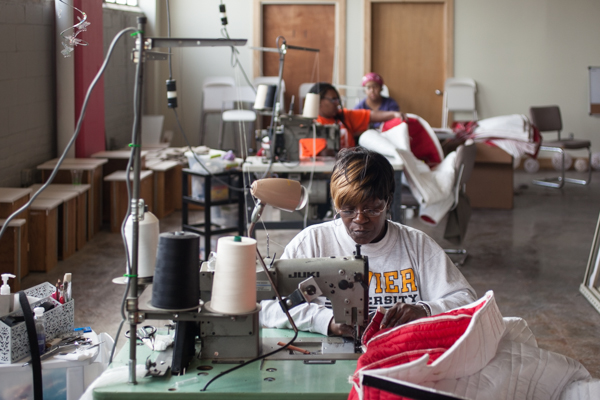
Social enterprises often require financial support as they work towards sustainability, but in Detroit, where old solutions have cured few of the city’s social ails, social entrepreneurs are finding benefactors.
“There’s a new open-mindedness to working across sectors, between government, businesses, philanthropies, and nonprofits,” says Garlow.
“I wouldn’t have been able to start the Empowerment Plan anywhere else but Detroit,” says Scott.
“Think what you will of these larger entities,” she says, referring to multi-billion dollar companies like General Motors and Quicken Loans, “but a company of that size anywhere else in the U.S. would not pay attention to a tiny startup of two people that were working out of a closet making 25 coats in an entire season.”
She says her company stayed afloat during lean times thanks in large part to corporate sponsorship.
“I think every company here, no matter what size, recognizes the need to support everyone to make the city better…One major company can’t be responsible for everything. They can’t feed the city or provide other kinds of necessities for their employees and customers.”
Thanks to that support, the Empowerment Plan will soon have a staff of 25 and expects to produce 6,000-10,000 coats in 2014.
The Michigan Model
On June 20 at the Max M. Fisher Music Center in Midtown Detroit, Michigan Corps celebrated the conclusion of its second annual Michigan Social Entrepreneurship Challenge (MSEC), which “provides visibility and resources to our state’s most promising [social] entrepreneurs.”
Following a series of panel discussions, a number of prizes were awarded to enterprises that demonstrated the ability to fulfill social needs and the potential to become financially sustainable. Prizes ranged from $5,000 cash awards to fellowship training to consulting and legal services.
At the end of the four-month fellowship program, in which businesses receive advising on their business plans and much more, entrepreneurs are given the opportunity to pitch directly to investors. Last year, the eight businesses that went through the program secured a total of $1.5 million in additional investment.
Part of this success, says Garlow, is due to a focus on investor education. Michigan Corps takes the unique step of interviewing investors in order to find and cultivate those who are sensitive to the risks inherent in social entrepreneurship.
Garlow hopes that the event, the nation’s first statewide entrepreneurial competition, can serve as a prototype for other communities.
“With this model, you can highlight particular regional problems and crowdsource a solution,” she says.
A group of colleges in Orange County, Calif. is organizing a similar event later this year to address their own set of unique problems. They’re referring to it as the “Michigan Model.”
Addressing systems, not symptoms
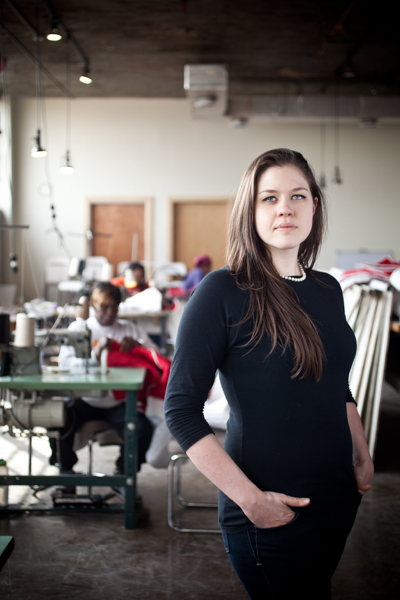
When Scott began showing a prototype of her coat to homeless people, a woman approached her and said that they needed jobs, not coats. Scott made a realization.
“Whether you give someone a small sum of money or a coat, it has a very limited window of effect,” she says. “[When the Empowerment Plan grows] I’ll be able to hire more and inherently affect more people.”
Though the coats she produces are useful, Scott notes that they are inessential to the core of her business — the Empowerment Plan could produce something different so long as it maintained its sustainability and capacity to hire the homeless.
Kimmelman says one of the most important things Fresh Corner Cafe can do is be an example.
“Growing this business is an opportunity to create best practice,” says Kimmelman. “That’s the greatest effect a social enterprise can have.”
The effect of the Michigan Model is already being felt here. Perhaps soon, Detroit’s greatest export won’t be cars, but social entrepreneurship.
Aaron Mondry is a Detroit-based writer and improv comedian.
All photos by Marvin Shaouni.
